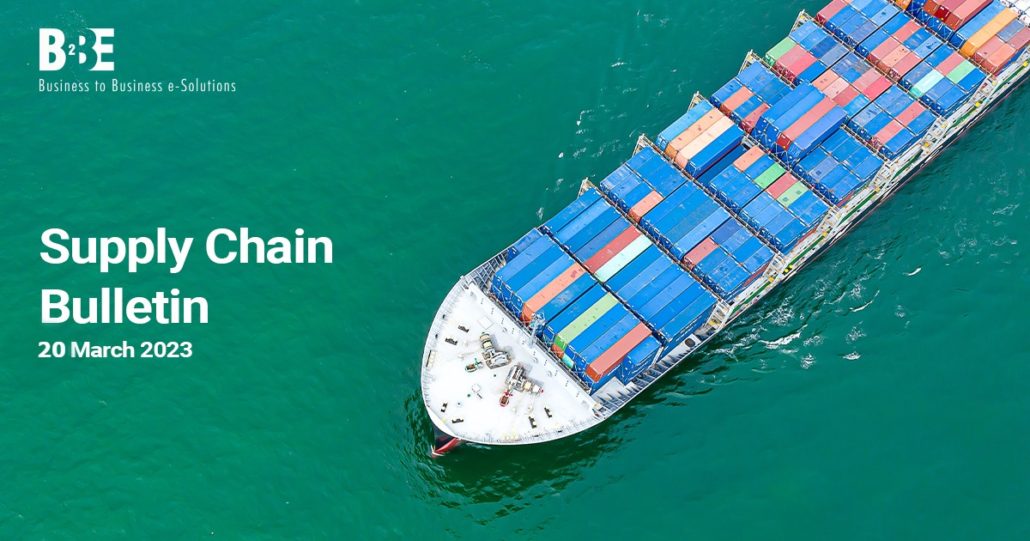This is your weekly supply chain bulletin from B2BE for the week starting 20th March 2023.
Each week, we bring you a rundown of the latest trends in the news from across the supply chain industry. We cover the issues most important to you, bringing you useful links to the full articles. This ranges from news on various supply chain disruptions to strategies to lessen the damage. We also include other relevant supply chain related updates. If you missed it, you can read last week’s supply chain bulletin here. Read on to see what’s making the news this week.
Collapse of major freight and logistics company highlights concern over Australia’s supply chain
The recent collapse of Scott’s Transport, a major freight and logistics company in Australia, has raised serious concerns about the country’s supply chain. According to financial expert Ross Greenwood, the company’s failure highlights the fragility of Australia’s logistics infrastructure. Particularly in rural areas where smaller operators are struggling to stay afloat. The collapse has also disrupted supply chains for major retailers and threatens to push up prices for consumers. Greenwood argues that the Australian government needs to address the issue by investing in infrastructure and supporting smaller operators. As well as incentivising local production to reduce reliance on global supply chains.
Supermarket supply chain costs increase by 10.4%
Supplier costs for groceries have increased this year by 10.4%. This is a total of four times greater than in February 2020, the third largest since 2018. Price jumps were recorded in every grocery department, the highest being in produce which averaged a 23% rise in cost, followed by frozen foods, seafood and butchery at 13%, 12% and 10% respectively. In January 2023, supply costs climbed 10.6% compared to a year earlier, with produce seeing a similar rise of 24%, and frozen food, seafood and butchery all climbing by over 10%.
Oatly recuse independence on logistics by moving to third-party providers
Oat milk maker Oatly is switching to an “asset-light” business model to stabilise its supply chain. This means the company is now using third-party logistics providers to manage distribution, rather than owning the assets itself. The move comes as a response to supply chain disruptions during the pandemic, which made it difficult for Oatly to keep up with demand. The company aims to create a more sustainable and resilient supply chain by reducing its dependency on assets and increasing collaboration with partners.
Germany and Japan look to establish new partnership to offer alternative supply chain options
Germany is looking to strengthen its economic ties with Japan in response to global supply chain tensions. The two countries plan to cooperate on various initiatives such as developing hydrogen technology and promoting digitalisation. This is in addition to increasing investment in renewable energy. This move comes as Germany seeks to diversify its supply chains and reduce its reliance on China, which has been a major supplier of goods for the country. Germany has expressed concerns about China’s human rights record and its trade practices, which have sparked tensions between the two countries. The partnership with Japan is therefore seen as a way for Germany to establish closer ties with a like-minded country that shares its values and can offer alternative supply chain options.
About B2BE
B2BE delivers electronic supply chain solutions globally, helping organisations to better manage their supply chain processes, providing greater levels of visibility, auditability and control. We’re driven by a passion for what we do, inspired by innovation, and underpinned by a wealth of knowledge. With over 20+ years of experience, the B2BE teams operate worldwide.
For more information, visit www.b2be.com.
